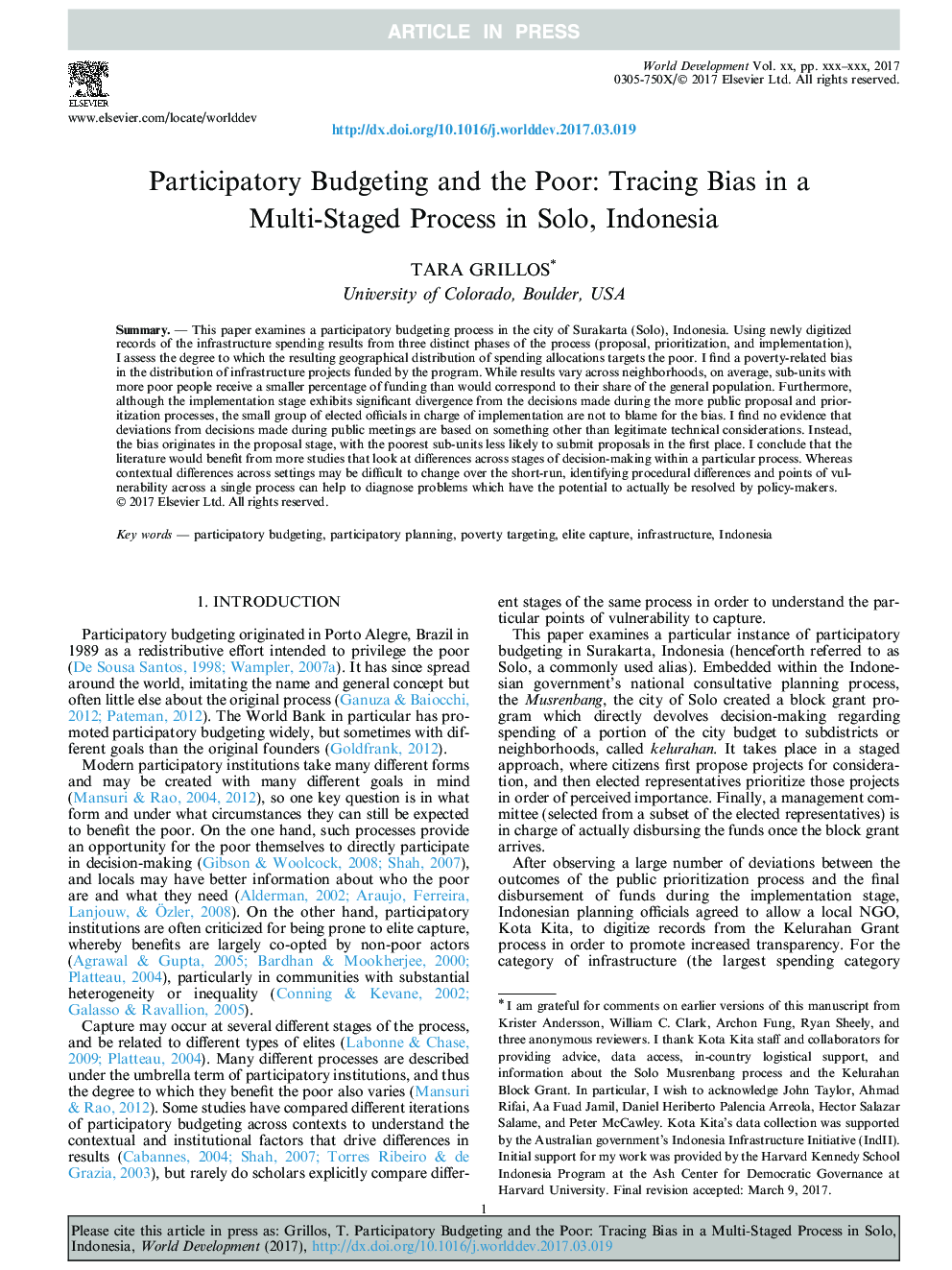| کد مقاله | کد نشریه | سال انتشار | مقاله انگلیسی | نسخه تمام متن |
|---|---|---|---|---|
| 5105066 | 1481122 | 2017 | 16 صفحه PDF | دانلود رایگان |
عنوان انگلیسی مقاله ISI
Participatory Budgeting and the Poor: Tracing Bias in a Multi-Staged Process in Solo, Indonesia
ترجمه فارسی عنوان
بودجه بندی مشارکتی و فقر: سوگیری ردیابی در فرآیند چند مرحله ای در انفرادی، اندونزی
دانلود مقاله + سفارش ترجمه
دانلود مقاله ISI انگلیسی
رایگان برای ایرانیان
کلمات کلیدی
بودجه مشارکتی، برنامه ریزی مشارکتی، هدف قرار دادن فقر، ضبط نخبگان، زیر ساخت، اندونزی،
ترجمه چکیده
این مقاله یک فرایند بودجوی مشارکتی در شهر سوکارکار (سولو)، اندونزی را مورد بررسی قرار می دهد. با استفاده از سوابق دیجیتال شده از هزینه های زیربنایی از سه مرحله مجزا از روند (پیشنهاد، اولویت بندی و اجرای)، من ارزیابی می کنم که میزان توزیع جغرافیایی ناشی از تخصیص بودجه به فقرا اهمیت می دهد. من تعصب مربوط به فقر را در توزیع پروژه های زیربنایی که توسط این برنامه تامین می شود پیدا می کنم. در حالی که نتایج در سراسر محله ها متفاوت است، به طور متوسط، بخش هایی با افراد فقیر بیشتر، درصد کمتر از بودجه را نسبت به سهم آنها از جمعیت عمومی دریافت می کنند. علاوه بر این، اگرچه مرحله اجرایی از تصمیماتی که در طول پیشنهاد عمومی و فرایندهای اولویت بندی بیشتر صورت گرفته است، اختلاف چشمگیری را نشان می دهد، گروه کوچکی از مقامات منتخب مسئول اجرای آن برای این تعصب سرزنش نمی شود. من هیچ شواهدی را نشان نمیدهم که انحراف از تصمیمات در جلسات عمومی بر اساس چیزی غیر از ملاحظات فنی قانونی باشد. در عوض، تعصب از مرحله پیشنهادی شروع می شود، و فقیرترین زیر واحد هایی که احتمالا در ابتدا پیشنهادات را ارائه می دهند. من نتیجه می گیرم که ادبیات از مطالعات بیشتری برخوردار است که در تفاوت های مختلف در مراحل تصمیم گیری در یک فرایند خاص مورد استفاده قرار می گیرند. در حالی که تفاوت های متنی در تنظیمات ممکن است برای تغییر در کوتاه مدت دشوار باشد، شناسایی تفاوت های رویه ای و نقاط آسیب پذیری در یک فرایند تنها می تواند به تشخیص مشکلات که ممکن است توسط سیاست گذاران واقعا حل شود.
موضوعات مرتبط
علوم انسانی و اجتماعی
اقتصاد، اقتصادسنجی و امور مالی
اقتصاد و اقتصادسنجی
چکیده انگلیسی
This paper examines a participatory budgeting process in the city of Surakarta (Solo), Indonesia. Using newly digitized records of the infrastructure spending results from three distinct phases of the process (proposal, prioritization, and implementation), I assess the degree to which the resulting geographical distribution of spending allocations targets the poor. I find a poverty-related bias in the distribution of infrastructure projects funded by the program. While results vary across neighborhoods, on average, sub-units with more poor people receive a smaller percentage of funding than would correspond to their share of the general population. Furthermore, although the implementation stage exhibits significant divergence from the decisions made during the more public proposal and prioritization processes, the small group of elected officials in charge of implementation are not to blame for the bias. I find no evidence that deviations from decisions made during public meetings are based on something other than legitimate technical considerations. Instead, the bias originates in the proposal stage, with the poorest sub-units less likely to submit proposals in the first place. I conclude that the literature would benefit from more studies that look at differences across stages of decision-making within a particular process. Whereas contextual differences across settings may be difficult to change over the short-run, identifying procedural differences and points of vulnerability across a single process can help to diagnose problems which have the potential to actually be resolved by policy-makers.
ناشر
Database: Elsevier - ScienceDirect (ساینس دایرکت)
Journal: World Development - Volume 96, August 2017, Pages 343-358
Journal: World Development - Volume 96, August 2017, Pages 343-358
نویسندگان
Tara Grillos,
